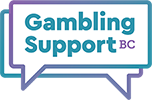
Harm from gambling is not just about losing money. Gambling harms can affect a person’s whole life.
Gambling can affect our wellness when it gets in the way of work, school or other activities, harms the person’s mental or physical health, hurts the person financially, damages the person’s reputation, or causes problems with family or friends.
Self-Assessment Tool
Doing an honest self-assessment—just checking in on ourselves once in a while—is very helpful in maintaining wellness. Take a moment to answer these self assessment questions.
(Attribution: Low Risk Gambling Guidelines)
This information is not intended to be used for diagnosis, treatment, or referral services. Individuals should contact their personal physician and/or their local addiction or mental health agency for further information.
Tip: If your score indicates you might be at risk, there are options available to you. See our support resources.
Gambling Continuum
Gambling problems occur along a continuum. These are not discrete categories but possible points along a range of involvement, from not gambling at all to a problematic relationship with gambling. People can move back and forth along the gambling continuum at different times in their lives, depending on a number of factors. Some people will try gambling and experience problems quickly, while others may gamble without issue their entire lives; others still may develop a problem with gambling over time.

Identifying Recreational vs. Problematic Gambling
| Recreational | Problematic |
|---|---|
People who engage in recreational gambling generally enjoy the time, money and energy they spend gambling. Gambling is viewed as a fun and exciting activity regardless of whether the person is winning or losing. | People who struggle with gambling products may experience anxiety when gambling and when thinking about or planning gambling. Although there may be times when gambling is enjoyable, it is more often stressful regardless of whether the person is winning or losing. |
People who engage in recreational gambling hope to win a prize or jackpot but generally accept that isn’t likely. They understand that the odds of winning are against them and they accept the degree of chance present in every gambling activity. The entertainment of gambling makes the risk of lost money worth it. | People who struggle with gambling products may have the view that gambling is a way to make money and therefore improve one’s life situation. Their identity may be wrapped up in gambling success/failure and they may have false beliefs about their degree of influence or control over the gambling outcome. |
People who engage in recreational gambling also engage in other recreational pastimes. Gambling doesn’t get in the way of their ability to attend to their family and other relationships, their job or other responsibilities and life pursuits. | People who struggle with gambling products may ignore other pastimes or commitments in order to devote more time and energy to gambling. Doing so may lead to feelings of guilt that can further isolate the person from other aspects of their life. |
People who engage in recreational gambling may feel disappointed after losing money but they accept it and move on. The money was bet with the understanding that no win may come of it. The money bet wasn’t needed for something essential like a bill payment or food purchase so the loss of it doesn’t cause feelings of stress and anxiety. | People who struggle with gambling products often feel more than just disappointment about lost money. The amount of money bet and lost may have more than the person intended. The money may not have belonged solely to the person (could be money shared between a couple/family). The money may have been for needed for something essential like a bill payment or food purchase. In these situations, it makes sense that the loss of money could be very stressful. |

